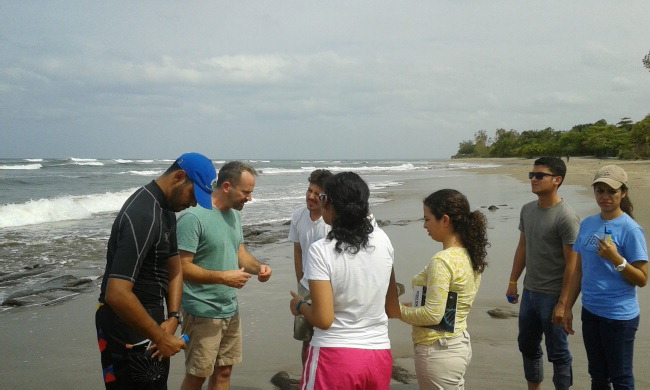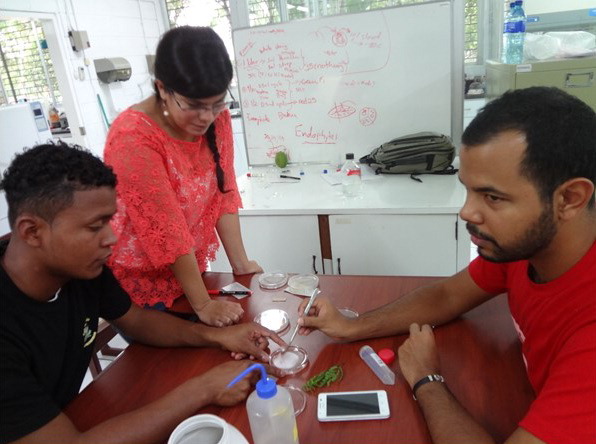PI: Jorge Huete-Pérez (Universidad Centroamericana - UCA)
U.S. Partner: Martin Polz (Massachusetts Institute of Technology)
Project Dates: August 2013 to April 2015
Project Overview
This PEER project sought to assemble an international network of scientists to train local researchers and assist them in the study of neglected Mesoamerican coastal marine biodiversity and the impact of climate change (e.g., via ocean acidification), specifically in Honduras, El Salvador, and Nicaragua. Using a cross-disciplinary approach integrating taxonomy, molecular biology, and genomic techniques with biodiversity conservation, the network identified gaps in knowledge to determine a new course of research on marine biodiversity in Mesoamerica and developed collaborative programs on the sustainable use of marine resources and anthropogenic influences on ocean biodiversity. The project sought to advance scientific and technical knowledge for informing development-related policies, improve the capacity of local institutions, enhance the technical infrastructure of local, and impact the broader community in the region through partnerships between researchers, community leaders, authorities, educators and students. The project built upon a foundation of collaboration between the PI’s team and counterparts in the European Union to work with communities in the Gulf of Fonseca to increase their awareness of the value of their marine resources.

| 
|
| Sample collection and ecological evaluation at Pochomil, Nicaragua (Photo courtesy Dr. Huete-Pérez). | Team members analyze and discuss isolates (Photo courtesy Dr. Huete-Pérez). |
Final Summary of Project Activities
The project began with training workshops on marine ecology and genomics techniques in October 2013 and March 2014, the latter including a week-long field trip to Juan Venado Island Nature Reserve. As the centerpiece of the project, Dr. Huete-Pérez and his team organized the VII International Conference on Central American Marine Biodiversity and Genomics in Managua May 8-10, 2014. The principal goal of this conference was to promote the development and use of biotechnology innovation in Nicaragua and surrounding countries and to create an international network for local marine biology exploration and research. Tandem goals of great importance included strengthening ties between the academic, governmental, non-governmental and private industry sectors; and providing training to local researchers in Nicaragua and the Central American region. Participants discussed key threats to the region’s marine ecosystems, priority topics for further study, and various constraints hindering the adoption and implementation of appropriate environmental management policies. To promote new collaborative linkages, there were also networking sessions for the international participants, including Nobel Laureate Sir Richard Roberts, to interact with local researchers and students.
As a follow-up to the conference, the PEER project team held a training workshop in August 2014 on methods and bioprospecting for research on marine microorganisms at the PI’s home institution. The week-long workshop, taught by Dr. Tracy Mincer of the Woods Hole Oceanographic Institution, included lectures, a field visit to Pochomil, a sandy beach on the Pacific coast of Nicaragua, and hands-on lab work. Attendees included delegates from various Nicaraguan institutions, including the Molecular Biology Center (CBM-UCA), the Bluefields Indian and Caribbean University (BICU), the University of the Autonomous Regions of the Caribbean Coast of Nicaragua (URACCAN), and UCA itself. As a result of the workshop, the team proposed the organization of a new research seminar series focused on marine conservation and bioprospecting, providing an informal setting to discuss current projects, data interpretation, and future proposals.
The Marine Biodiversity Initiative Project continued with another set of workshops in February and March 2015 to provide specific training for young researchers from CBM-UCA focused on two main topics, the microbial quality of medicinal plant materials and biodiversity and sustainable use of fish in the coastal zone of Central America. After the project was completed, Dr. Huete-Pérez reported that he and his colleagues were seeking support from other sponsors for new research projects focused on marine conservation and bioprospecting.
Back to PEER Cycle 2 Grant Recipients





